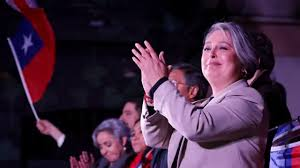By Rodolfo Varela
Jeannette Jara's recent victory in the progressive bloc's presidential primaries is not just an electoral milestone; it is a symptom of a country still searching for deep answers to structural problems left unresolved by every administration since the return to democracy.

With 60% of the vote in a low-turnout primary, the communist leader became the first woman from her party to be endorsed by the entire left to run for Chile's presidency.
But her triumph cannot be understood solely in partisan terms. It is, above all, a sign of fatigue with the traditional elites —both left and right— who have governed in recent decades with unfulfilled promises, incomplete reforms, and a historical reparation process that has remained more rhetorical than real.
A Candidacy from the Margins
Born in Conchalí, the daughter of working-class parents, the first professional in her family, and a widow at a young age, Jeannette Jara embodies the biography of countless Chilean women long ignored by elite politics. She does not come from the affluent neighborhoods or famous surnames. Her story —and her warm, conciliatory yet firm demeanor— allowed her to connect with a public weary of double standards.
As Minister of Labor under President Gabriel Boric, Jara pushed forward key reforms: reducing the workweek to 40 hours, raising the minimum wage, and advancing pension system reform. All this while her rivals got entangled in ideological debates or tried to distance themselves from the Communist Party, more worried about alliances than real people.
A Crosscutting Critique: Governments That Failed
If she does reach La Moneda, her challenge will be far greater: governing a country that has delayed addressing socially unacceptable debts for decades. Right-wing administrations like Sebastián Piñera’s prioritized repression, neoliberal orthodoxy, and pacts with big business. Center-left governments like those of Michelle Bachelet and Ricardo Lagos spoke of social justice but ended up pragmatically managing the same exclusionary system.
They all failed in one crucial area: delivering justice and reparation to the victims of the dictatorship. Today, thousands of politically exonerated citizens, former prisoners, torture survivors, and families broken by illegal adoptions survive on miserable pensions —often less than half the minimum wage. This open wound has been deepened by institutional indifference, judicial silence, and the complicity of some religious sectors.
No president has ever truly prioritized reparation. Symbolic gestures have never translated into concrete dignity.
The Weight of the Communist Party… and Her Independence
Ironically, Jara won in spite of the Communist Party. Her public disagreements with party president Lautaro Carmona —on issues like Cuba and constitutional reform— showed a necessary independence that was key to her success. Yet, that same independence may become a minefield if she is elected. Can she maintain a healthy distance without losing her party’s support?
Her openness to the political center will also be closely watched. Socialist Party candidate Carolina Tohá, now expected to support Jara, bluntly stated during the campaign: “The communist model has not succeeded anywhere in the world; it has had adverse outcomes.” Will moderates truly support her, or will they —through omission or calculation— help pave the way for the far right?
Kast, Matthei, and the Specter of Security
With far-right candidate José Antonio Kast leading the polls, Jara’s challenge is twofold: broaden her base and restore public confidence in a progressive camp that many perceive as ineffective in addressing core issues. Public anxiety over security, economic hardship, and crime fuels a volatile electorate prone to authoritarian appeals.
In this context, Jara’s appeal for unity —“Let us not let go of each other's hands”— takes on real urgency. Yet the hands of the Chilean left have long been fragmented. She must now prove that her leadership is not just an electoral phenomenon, but a genuine opportunity to rebuild an ethical and effective national project.
Conclusion: The Time for Truth
Jeannette Jara does not have an easy road ahead. Her life story gives her credibility, but the country is wounded. Symbolic gestures and unity speeches are not enough. Chile needs bold decisions: a real plan for justice for the victims of state terrorism, a people-centered economy, and a politics that stops serving the same old names.

We want a more just, more compassionate, and truly Chilean country —one where power stops revolving around the same surnames and starts building from memory, equality, and the dignity of those who have always been left behind.
Because a country without memory, without history, is a country without a future. And Chile can no longer afford to ignore its past or postpone its future.

No hay comentarios:
Publicar un comentario